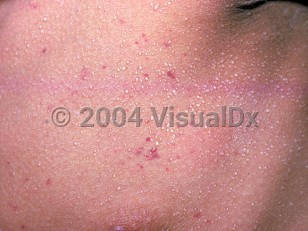Miliaria crystallina in Infant/Neonate
Alerts and Notices
Important News & Links
Synopsis

Miliaria crystallina, also referred to as sudamina, is due to occlusion of the eccrine ducts at the superficial epidermis or stratum corneum. It may occur at any age but is common in neonates and infants, probably secondary to the immaturity and weakness of the duct structure. Clinically, it presents as largely asymptomatic 1- to 2-mm fragile vesicles. It has predilection for the face, neck, upper torso, and occluded areas. Fever, exposure to warm and humid environmental conditions, and occlusion (excessive clothing or swaddling) are predisposing factors.
Superficial occlusion is thought to result from increased hydration compounded with humidity and sweating. When the occlusion of the sweat duct is deeper in the epidermis, miliaria rubra (prickly heat), miliaria pustulosa, or miliaria profunda (skin-colored papules with possible associated hypohidrosis or anhidrosis) may result.
Codes
L74.1 – Miliaria crystallina
SNOMEDCT:
44279002 – Miliaria crystallina
Look For
Subscription Required
Diagnostic Pearls
Subscription Required
Differential Diagnosis & Pitfalls

Subscription Required
Best Tests
Subscription Required
Management Pearls
Subscription Required
Therapy
Subscription Required
Drug Reaction Data
Subscription Required
References
Subscription Required
Last Updated:07/14/2019

